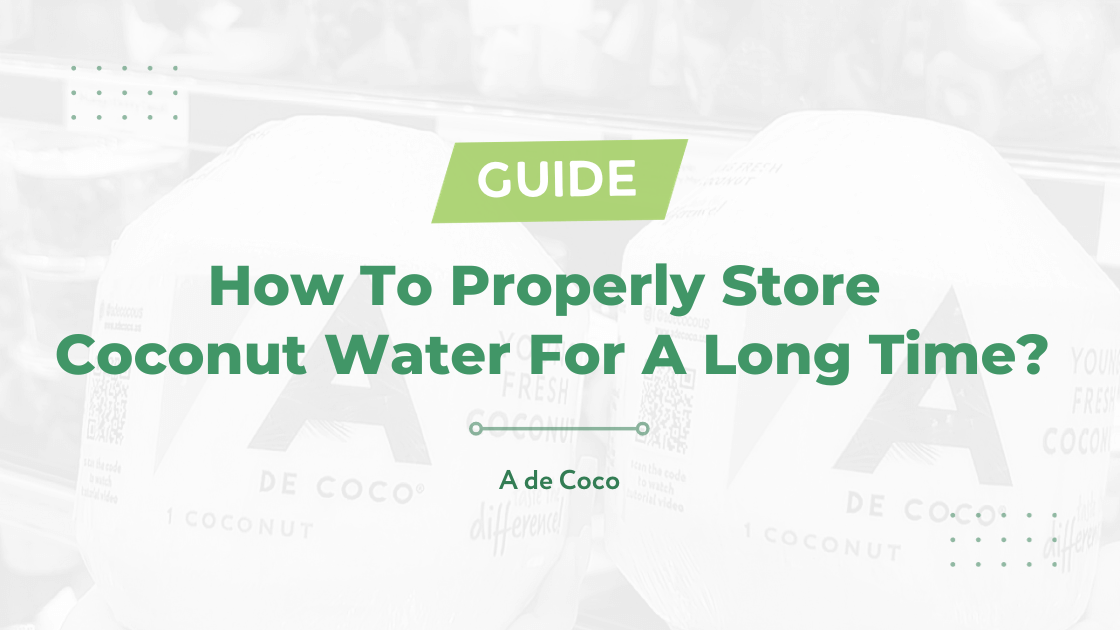As a rich source of essential nutrients, coconut water has increasingly become a popular drink across various cultures worldwide.
With its distinct, mildly sweet flavor, and impressive health benefits, it’s no wonder individuals are seeking ways to conserve its freshness for extended periods.
However, incorrect storage can lead to a loss of its taste and nutritional value.
While refrigeration is the most common method, it may not guarantee a prolonged shelf life.
Moreover, improper storage can also contribute to the growth of harmful bacteria.
Understanding the best practices for storage is therefore crucial to ensure maximum longevity and nourishment.
Contents
- How To Properly Store Coconut Water For A Long Time?
- The Right Way to Store Opened Coconut Water
- Can You Freeze Fresh Coconut Water?
- How Long Does Coconut Water Last in the Fridge?
- Signs Your Stored Coconut Water Has Gone Bad
- Factors Influencing Shelf Life of Coconut Water
- Benefits of Properly Stored Coconut Water
- Final Thoughts
How To Properly Store Coconut Water For A Long Time?
To properly store coconut water for a long term, you should first ensure it is sealed tightly in an airtight and preferably glass container to prevent oxidization and bacterial growth. Next, place the container in the refrigerator, as cool temperatures also slow down microbial growth and chemical reactions that can spoil the coconut water. If you want to store it for months, consider freezing it, but make sure it is in a freezer-safe container to account for the expansion that occurs when liquids freeze.
Beyond the importance of correctly storing your coconut water, it’s also crucial to understand how to properly defrost it and maintain its freshness post-freezing.
Further, we will delve into details on how the source of your coconut water, its extraction process, and its method of packaging can affect its shelf-life, potential health benefits, taste, and general quality.
There’s also an informative segment on potential signs of spoilage and safety precautions to ensure you are consuming healthy and fresh coconut water.
So, let’s deep dive into these essential details.
The Right Way to Store Opened Coconut Water
Understanding the proper way to store opened coconut water is paramount in maintaining its freshness and nutrient content.
The first step, after opening your coconut water, is to ensure it is immediately refrigerated.
– Importance of Immediate Refrigeration
Refrigerating your coconut water prevents bacterial growth, prevents it from going sour, and ensures it remains safe for consumption.
Remember, opened coconut water provides a perfect breeding ground for bacteria due to the natural sugars present.
Your goal should be to slow down this bacterial multiplication as much as possible by storing it at cold temperatures.
Refrigerating opened coconut water inhibits bacterial growth and ensures it remains safe for consumption.
This is why immediate refrigeration is highly recommended.
It plays an essential role in extending the shelf-life of opened coconut water.
The nature of coconut water makes it highly susceptible to spoilage once exposed to air and warm temperatures.
Now, when we’re talking about unopened coconuts like A de Coco’s Young Fresh Coconuts, the best way would be to keep it unopened for as long as you’re not going to drink it.
If the coconut has been opened and for some reason, you wish to keep some of its water for later, then everything else we’ll talk about will be helpful.
– The Right Container to Use
Right after you refrigerate, another aspect to consider is the type of container you store the coconut water in.
For ideal freshness, store your coconut water in a glass container with a tight lid.
Glass is recommended because it is non-reactive and will not infuse any unwanted substances.
Ensure the lid is tightly sealed to lock in freshness and prevent any potential contaminants.
A glass container with a tight lid is ideal for storing coconut water to lock in freshness and prevent any potential contaminants.
This method helps to keep the coconut water safe, fresh, and tasty for a longer time.
– Limiting Duration of Storage
Despite storing your opened coconut water correctly, it’s essential to drink it within 24 to 48 hours.
This time-frame might vary based on factors such as the type of coconut, its maturity, and the initial freshness, but it’s a good rule of thumb.
Waiting too long before consumption could lead to a decline in quality and potentially harmful bacterial growth.
For practical clarity on how to open a fresh coconut, you may find this video a lot useful.
It demonstrates how you can easily and safely open a fresh young coconut at home.
Can You Freeze Fresh Coconut Water?
When it comes to preserving fresh coconut water, one of the most frequently asked questions is whether or not it is possible to freeze it.
Indeed, freezing fresh coconut water is not only possible, but it is also an effective method to extend its shelf life.
This method allows the coconut water to retain its nutritional value and flavor for a longer period as compared to keeping it at room temperature or in the refrigerator.
The rationale behind this lies in the fact that freezing slows down the growth of microorganisms, which are mainly responsible for the spoilage of food and drinks, including coconut water.
As a result, your fresh coconut water remains safe for consumption for a much longer period when frozen as compared to other storage methods.
But beware, that freezing it could also affect its taste slightly, as it tends to concentrate the sugar more than normal.
– How to Freeze Fresh Coconut Water?
Before freezing your coconut water, ensure it is stored in a suitable container.
Most experts recommend using a plastic container or ice cube trays for this purpose.
Ice cube trays are particularly recommended for those who want to freeze smaller portions, which can later be defrosted individually as per requirement.
Ice cube trays are particularly recommended for those who want to freeze smaller portions, which can later be defrosted individually as per requirement.
This is an excellent idea, especially if you only consume small quantities of coconut water at a time.
Once the coconut water is poured into the container or ice cube trays, secure it with a lid and place it in the freezer.
– Thawing/Defrosting Frozen Fresh Coconut Water
When you need to consume the frozen coconut water, the next stage is thawing/defrosting.
It’s crucial to thaw frozen coconut water properly to keep its quality intact.
Usually, the best way to do this is by transferring it from the freezer to the refrigerator to allow it to thaw slowly and evenly.
The best way to thaw frozen coconut water is by transferring it from the freezer to the refrigerator to allow it to thaw slowly and evenly.
Rushing the thawing process or using high temperatures can result in a change in the texture and flavor of the coconut water, making it less enjoyable to consume.
Once the coconut water is completely thawed, give it a quick stir to ensure the taste is uniform, and enjoy your refreshing and healthy drink.
– How Long Can You Store Frozen Fresh Coconut Water?
Frozen fresh coconut water can be stored in the freezer for a reasonably long period.
If stored properly, it can maintain its taste and nutritional benefits for much longer.
However, for the best quality, it is recommended to consume the frozen coconut water within six months.
For the best quality, it is recommended to consume frozen coconut water within six months.
Remember, while freezing will not make the coconut water unsafe to consume, the quality in terms of taste and texture might start deteriorating after this time.
Ultimately, freezing fresh coconut water can be a convenient and effective solution to ensuring you can enjoy this nutritious beverage anytime, while minimizing waste due to spoilage.
How Long Does Coconut Water Last in the Fridge?
The perishability of coconut water after it’s been opened is an issue many people have questions about.
Unlike canned or bottled beverages, the shelf life of coconut water can be significantly reduced once it’s been opened.
Generally speaking, opened coconut water can last anywhere from 1-2 weeks in the refrigerator.
– The Role of Refrigeration in Preserving Coconut Water
One of the key factors in preserving the freshness of coconut water is the temperature at which it’s stored.
When stored in a cool and consistent environment like a refrigerator, coconut water can retain its quality for a longer period.
While some might prefer the convenience of storing opened coconut water at room temperature, doing so can significantly reduce its shelf life.
The ideal temperature for storing opened coconut water is between 35 and 40 degrees Fahrenheit.
At these temperatures, it’s cold enough to prevent bacterial growth, which is one of the main factors that contribute to the spoilage of coconut water.
However, it’s not so cold that the coconut water starts to freeze, which can adversely affect its taste and quality.
– The Impact of Storage Conditions on Coconut Water’s Shelf Life
Another crucial factor that can influence how long coconut water lasts in the fridge is the overall storage conditions.
For instance, placing your opened coconut water on the refrigerator door, which is generally the warmest part of the fridge, can reduce its longevity.
Instead, it’s recommended to store coconut water on one of the shelves within the fridge where the temperature is more consistent.
Properly sealed containers can prevent contamination, further prolonging the shelf life of your coconut water.
The type of container in which the coconut water is stored can also have a significant impact on its shelf life.
Containers with tight-fitting lids can prevent exposure to air and other contaminants, helping to maintain its freshness for longer periods.
Moreover, glass containers are often recommended over plastic ones due to their non-porous nature, which prevents the coconut water from absorbing any potential odors or flavors from the fridge.
– Always Check the Expiry Date
Lastly, regardless of how carefully you store your coconut water, always make sure to check the expiry date on the packaging.
Even with the best storage practices, no beverage can last indefinitely.
And so it’s important to consume your coconut water before the printed expiration date to ensure it’s safe to drink.
Signs Your Stored Coconut Water Has Gone Bad
Just like any other edible product, coconut water too can spoil over time.
It’s important to know how to discern if your stored coconut water has gone bad.
There are certain signs that can indicate that your stored coconut water is no longer good to consume.
– Change in Texture and Color
One of the most obvious signs of spoiled coconut water is a change in its texture and color.
Fresh coconut water is generally clear and nearly colorless.
Over time, if not stored properly or if it has been stored for a prolonged period, coconut water may begin to turn cloudy or gray.
This might be due to the presence of harmful bacteria or yeast.
Even slight deviations from its natural state can indicate that the water has turned bad, and consumption should be avoided.
– Offensive Odor
Another sign that your stored coconut water has gone bad is an offensive odor.
Fresh coconut water has a sweet, nutty aroma.
If this smell starts to become sour, similar to that of vinegar or alcohol, it’s a clear sign that the coconut water has spoiled.
An offensive odor emanating from the coconut water can be a clear indication of spoilage.
Such smell often results from a fermentation process caused by the growth of bacteria or fungus, indicating the coconut water is unsafe for consumption.
– Change in Taste
One more detectable sign of spoilage in coconut water is a change in taste.
Fresh coconut water has a sweet, mildly nutty taste.
If you detect a sour, tangy, or fermented taste, it means the coconut water has gone bad.
A sour, tangy, or fermented taste is a clear sign that the coconut water has gone bad.
This change in taste is similarly due to the growth of harmful microbes in the water, making it unfit for consumption.
It’s always better to taste a small quantity before consuming the whole amount to avoid food-borne illnesses.
– Presence of Mold
Last but not least, the presence of mold in or around the storage container is a surefire sign of spoilage.
Mold comes in various forms – it may appear as fuzzy spots on the surface of the water or as discoloration on the inside of the coconut or container.
The presence of mold in or around the storage is a surefire sign of spoilage.
Always remember, when in doubt, it’s better to be safe than sorry.
If any of these signs of spoilage are present, it’s best to discard the coconut water and avoid risking your health.
Factors Influencing Shelf Life of Coconut Water
The shelf life of coconut water can be influenced by a variety of factors.
These can range from how it is stored, the quality of the product, including its water content, the temperature at which it’s kept to the packaging it comes in.
Certain factors provide suitable conditions for bacterial growth leading to faster degradation.
It is therefore essential to understand the elements impacting the shelf life of coconut water to optimize its storage and ensure it remains fresh for a prolonged period.
– Storage Conditions
One factor that significantly influences the shelf life of coconut water is the storage conditions.
Keeping your coconut water in a cool, dry place away from direct sunlight can greatly extend its shelf life.
Once opened, coconut water should ideally be refrigerated.
This slows down the fermentation process and prevents bacterial growth, maintaining the fresh taste for a longer period.
Keeping your coconut water refrigerated after opening it should prevent it from turning sour or developing unpleasant odors, which are signs of spoilage.
Additionally, always sealing the container after use helps maintain its original flavor and nutrients.
– Quality of the Coconut
The quality of the coconut used also plays a crucial role in determining the shelf life of the coconut water.
Fresh, mature coconuts tend to produce better quality coconut water compared to younger ones, thus improving its lifespan when stored properly.
In contrast, coconut water from young coconuts or coconuts of lower quality may not last as long, especially if not properly handled and stored.
This is where the quality control during the production of coconut water comes in to play a critical role.
Through this video, you may gain insights on possible health risks associated with consuming excess coconut water.
It further educates you on ensuring you enjoy the myriad benefits of coconut water responsibly.
– Packaging
The packaging in which the coconut water is stored greatly impacts its shelf life.
Coconut water that is sealed airtight in a bottle or can in a factory has a considerably longer shelf life compared to coconut water that is hastily or inadequately sealed at home.
Such factory-sealed bottles or cans sometimes contain preservatives to keep the water fresh for longer.
On the other hand, poorly packaged coconut water can become contaminated quickly due to exposure to air, thus reducing its shelf life.
Hence, proper packaging is key to maximizing the shelf life of coconut water.
Thus, understanding how to properly store your coconut water, recognizing the quality of the coconut it comes from, and ensuring suitable packaging can go a long way in maintaining both the taste and nutritional value of your coconut water for much longer.
Benefits of Properly Stored Coconut Water
Proper storage of coconut water is crucial not just for longevity, but also for maintaining its exceptional nutritional profile.
Coconut water is a natural reservoir of many essential nutrients that offer several health benefits.
When stored properly, coconut water retains its original flavor and freshness, allowing you to enjoy the refreshing tropical drink whenever you crave it.
Improper storage can lead to the development of mold and bacteria, making the water unfit for consumption.
– The Preservation of Nutrients
Coconut water contains a variety of essential nutrients including potassium, magnesium, calcium, and phosphorus.
It also contains antioxidants, which help in reducing inflammation and boosting immunity.
The correct storage of coconut water ensures the preservation of these nutrients over time.
Exposure to environmental factors such as sunlight and heat can lead to nutrient degradation, decreasing the health benefits provided by this tropical drink.
As a blockquote, “The correct storage of coconut water ensures the preservation of these nutrients over time.”
This supports the idea that proper storage is beneficial in extending not just the drink’s lifespan but also its nutrient value.
In essence, proper preservation methods prevent the degradation of important nutrients, maintaining coconut water’s reputation as a health-boosting refreshment.
– Maintaining Hydration
Coconut water is a perfect rehydration drink due to its electrolyte composition.
It’s popular among athletes and fitness enthusiasts for its ability to replenish lost electrolytes during physical activities.
Proper storage of coconut water will allow it to retain these electrolytes, such as potassium and sodium which are responsible for rehydration.
Keeping it fresh will enable it to continue serving as a natural and effective hydration solution.
This can help reinforce and further contextualize the information provided here.
– Saving Money and Reducing Waste
By learning how to store your coconut water properly, you’re not just preserving its taste and nutritional benefits, but you’re also saving money and reducing waste.
Discarding coconut water because it went bad due to poor storage can accumulate into a significant expense over time.
Implementing proper storage techniques not only extends the shelf life of the coconut water but also reduces unnecessary expenditure on wasted products.
It’s an effortless way to contribute to a more sustainable lifestyle.
In summary, “Implementing proper storage techniques not only extends the shelf life of the coconut water but also reduces unnecessary expenditure on wasted products.”
Thus, storage methods allow the optimization of your coconut water’s lifespan, economic investment, and nutritional potency.
Evidently, knowing how to store this drink properly is beneficial in multiple ways.
Final Thoughts
Overall, proper storage of coconut water can greatly enhance its longevity and maintain its quality.
Whether store-bought or freshly squeezed, keeping it in a cool environment such as a fridge can maximize its shelf life, while correct packaging can also prevent it from going bad.
Freezing coconut water is plausible and does not affect its quality.
It is also vital to heed the visual and olfactory signs suggesting that your coconut water may have gone bad to avoid any potential health risks.
Ensuring good storage practices not only retains the amazing health advantages of coconut water but also prevents wastage.
And finally, remember that homemade coconut water may require extra care to increase its shelf life.
With these tips in mind, you can enjoy your coconut water at its finest for longer periods.




